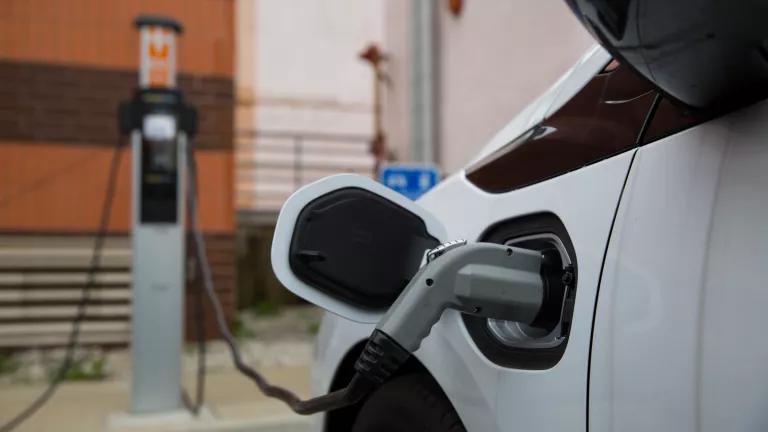Cheaper and Cleaner: Electric Vehicle Owners Save Thousands
A new study conducted by Atlas Public Policy shows that electric vehicles will save owners thousands when compared to gasoline internal combustion engine counterparts.

Here’s some good news: Not only is owning an electric vehicle (EV) better for the climate, but it can save owners thousands of dollars. A new study from Atlas Public Policy, conducted on behalf of NRDC, showed that for every major type of vehicle, owning an EV will save car owners money over a seven-year span, the average amount of time a driver keeps a new vehicle.
The study compared five 2024 electric vehicle models against their popular gasoline internal combustion engine counterparts based on their total cost of ownership. The total cost of ownership includes the purchase price minus the expected resale value, fuel, maintenance and repairs, insurance, taxes, and fees of each vehicle.
Vehicle Comparisons

Total cost of ownership comparison for electric and gasoline-fueled vehicles
Atlas Public Policy
Transportation costs generally account for the second-largest household expenditure after housing costs. Additionally, households in the lowest-income cohort face the largest transportation cost burden, spending almost a third of their income on transportation. Having access to transportation is directly correlated to economic mobility.
One study conducted by researchers at Harvard University found that low-income families are less likely to become financially secure in areas with longer average commute times. With transportation expenses making up such a large portion of people’s budgets, households are often faced with hard financial decisions of having to forego other necessities.
Since 91.5 percent of households in the United States own at least one vehicle, the savings of EV ownership are ones that almost everyone can benefit from, whether they are buying a new or used vehicle. While the cost of buying a new vehicle—electric or gasoline-fueled—is not affordable for many households, going electric is still likely cheaper in either case. And, as more EVs enter the used car market, savings on fuel and maintenance costs will be accessible at a lower up-front cost, especially with the new tax credit for used electric vehicles. There are more and more used EVs available—triple what they were three years ago. The savings to be had from purchasing a used electric vehicle are here.
This new study adds to the larger body of research and data showing an overall consistent decrease in EV prices. Compared to a similar analysis that Atlas Public Policy conducted in 2022, the total cost savings for electric models increased, largely driven by sticker prices dropping significantly. For example, the 2022 analysis compared a Toyota Corolla (gas-powered vehicle) to a Chevrolet Bolt (EV) and found that Bolt owners would save about $3,000 dollars. The updated study shows that in just two years, the Chevrolet Bolt savings more than tripled to $10,581 compared to a Toyota Corolla. This trend is largely driven by a lower up-front price for the Bolt. The conclusion was similar across all five popular model comparisons. The conclusions are clear: Buying electric is the more affordable, long-term option.
There are several reasons why we are seeing these vehicle owner savings increase with each year. As a baseline, electric vehicles are cheaper to fuel due to the stable costs of electricity compared with the volatile costs of gasoline. Depending on the model analyzed, EV drivers generally spend about 40 to 65 percent less annually on fuel costs than gas-powered vehicle drivers do. These fuel savings can increase by charging when electricity is cheaper for those on time-of-use rates. This is when charging is done during off-peak hours (usually during the late night and early morning) when electricity demand is at its lowest, resulting in the lowest electricity rates possible. Since nearly 90 percent of electric car charging is currently done overnight at home, these savings are obtainable. Additionally, electric vehicles have fewer mechanical components than their gas-powered counterparts and therefore require less maintenance. Because of this, EV drivers of the models analyzed save, on average, 40 percent on repair and maintenance costs.
Along with the savings from cheaper fuel and maintenance costs, the average up-front prices of electric vehicles have been rapidly declining as technologies advance. From just September 2022 to September 2023, the average price of a new EV has dropped nearly $15,000. The majority of an electric vehicle’s costs come from the lithium-ion battery, and the costs of those batteries have declined 89 percent between 2008 and 2022. In addition to the advances in technology, incentives and tax credits have also greatly contributed to the downward cost trends of EVs. While the up-front costs of electric vehicles are generally still a bit higher than its gas vehicle counterparts, sticker prices have been declining rapidly each year, and as they continue to do so, will create even more savings on electric vehicle ownership.
This recent study by Atlas Public Policy confirms what we already know: Switching from a gas-powered car to an electric one will save drivers thousands of dollars in the long run. Not only are EVs better for community health and for the environment, but with the total cost of ownership of electric vehicles continuously showing they are the cheaper option, there has never been a better time to make the change to electric.



